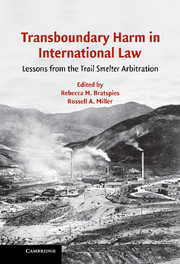Book contents
- Frontmatter
- Contents
- Contributors
- Acknowledgments
- Foreword by David D. Caron
- TRANSBOUNDARY HARM IN INTERNATIONAL LAW
- Introduction
- PART ONE THE TRAIL SMELTER ARBITRATION – HISTORY, LEGACY, AND REVIVAL
- 1 “An Outcrop of Hell”: History, Environment, and the Politics of the Trail Smelter Dispute
- 2 The Trail Smelter Dispute [Abridged]
- 3 Of Paradoxes, Precedents, and Progeny: The Trail Smelter Arbitration 65 Years Later
- 4 Pollution by Analogy: The Trial Smelter Arbitration [Abridged]
- 5 Has International Law Outgrown Trail Smelter?
- 6 The Flawed Trail Smelter Procedure: The Wrong Tribunal, the Wrong Parties, and the Wrong Law
- 7 Rereading Trail Smelter [Abridged]
- 8 Trail Smelter and the International Law Commission's Work on State Responsibility for Internationally Wrongful Acts and State Liability
- 9 Derivative versus Direct Liability as a Basis for State Liability for Transboundary Harms
- 10 Transboundary Pollution, Unilateralism, and the Limits of Extraterritorial Jurisdiction: The Second Trail Smelter Dispute
- PART TWO TRAIL SMELTER AND CONTEMPORARY TRANSBOUNDARY HARM – THE ENVIRONMENT
- PART THREE TRAIL SMELTER AND CONTEMPORARY TRANSBOUNDARY HARM – BEYOND THE ENVIRONMENT
- Annex A Convention Between the United States of America and the Dominion of Canada Relative to the Establishment of a Tribunal to Decide Questions of Indemnity and Future Regime Arising from the Operation of Smelter at Trail, British Columbia
- Annex B Trail Smelter Arbitral Tribunal Decision, April 16, 1938
- Annex C Trail Smelter Arbitral Tribunal March 11, 1941, Decision
- Index
1 - “An Outcrop of Hell”: History, Environment, and the Politics of the Trail Smelter Dispute
Published online by Cambridge University Press: 08 September 2009
- Frontmatter
- Contents
- Contributors
- Acknowledgments
- Foreword by David D. Caron
- TRANSBOUNDARY HARM IN INTERNATIONAL LAW
- Introduction
- PART ONE THE TRAIL SMELTER ARBITRATION – HISTORY, LEGACY, AND REVIVAL
- 1 “An Outcrop of Hell”: History, Environment, and the Politics of the Trail Smelter Dispute
- 2 The Trail Smelter Dispute [Abridged]
- 3 Of Paradoxes, Precedents, and Progeny: The Trail Smelter Arbitration 65 Years Later
- 4 Pollution by Analogy: The Trial Smelter Arbitration [Abridged]
- 5 Has International Law Outgrown Trail Smelter?
- 6 The Flawed Trail Smelter Procedure: The Wrong Tribunal, the Wrong Parties, and the Wrong Law
- 7 Rereading Trail Smelter [Abridged]
- 8 Trail Smelter and the International Law Commission's Work on State Responsibility for Internationally Wrongful Acts and State Liability
- 9 Derivative versus Direct Liability as a Basis for State Liability for Transboundary Harms
- 10 Transboundary Pollution, Unilateralism, and the Limits of Extraterritorial Jurisdiction: The Second Trail Smelter Dispute
- PART TWO TRAIL SMELTER AND CONTEMPORARY TRANSBOUNDARY HARM – THE ENVIRONMENT
- PART THREE TRAIL SMELTER AND CONTEMPORARY TRANSBOUNDARY HARM – BEYOND THE ENVIRONMENT
- Annex A Convention Between the United States of America and the Dominion of Canada Relative to the Establishment of a Tribunal to Decide Questions of Indemnity and Future Regime Arising from the Operation of Smelter at Trail, British Columbia
- Annex B Trail Smelter Arbitral Tribunal Decision, April 16, 1938
- Annex C Trail Smelter Arbitral Tribunal March 11, 1941, Decision
- Index
Summary
SMOKE EATERS
One of the great moments in Canadian hockey history belongs to the small town of Trail, British Columbia. In 1961, a local amateur team from Trail captured the gold medal at the World Hockey Championships, a victory that, at the time, appeared to reaffirm Canada's dominance in international hockey. It turned out to be the end of an era. Thirty-three years passed before another Canadian team – this time composed of elite professionals from the National Hockey League – won the prestigious global tournament. As Canada marched toward victory at the 1994 event, the national media wistfully described the team's quest as the “Trail to Gold,” thereby linking past glories with the glittering promise of present opportunities.
What interests me here, however, is not Canada's international hockey reputation, but the Trail team's unlikely nickname: the Smoke Eaters. In truth, the name Smoke Eaters accurately reflected the reality of life in that community. To live in Trail was literally to be an eater of smoke, a consumer of the relentless emissions that poured from the stacks of the local smelter. Built by American mining promoters in 1896, the Trail smelter was consolidated with several mines in nearby Rossland under the ownership of Canadian Pacific in 1906. After the Great War, the Consolidated Mining and Smelting Company perfected the metallurgical process for the refining of low-grade zinc ores, a technological innovation that reflected Trail's transformation from an unstable mining frontier to the smelting capital of British Columbia.
- Type
- Chapter
- Information
- Transboundary Harm in International LawLessons from the Trail Smelter Arbitration, pp. 13 - 26Publisher: Cambridge University PressPrint publication year: 2006
- 2
- Cited by



